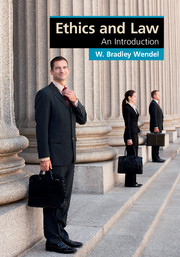Book contents
- Frontmatter
- Contents
- Preface
- Part I Lawyers, ethics, and the law
- 1 Defining the problem
- 2 Justifying principles of professional ethics
- 3 The adversary system
- 4 The nature of law and why it matters
- 5 Legal obligation and authority
- 6 Unjust laws and legal systems
- Part II The many roles of lawyers
- References
- Index
- References
5 - Legal obligation and authority
Published online by Cambridge University Press: 05 October 2014
- Frontmatter
- Contents
- Preface
- Part I Lawyers, ethics, and the law
- 1 Defining the problem
- 2 Justifying principles of professional ethics
- 3 The adversary system
- 4 The nature of law and why it matters
- 5 Legal obligation and authority
- 6 Unjust laws and legal systems
- Part II The many roles of lawyers
- References
- Index
- References
Summary
This chapter moves from conceptual questions about the nature of law to moral questions about the relationship between citizens and government. The notions of obligation and authority are central to the way we understand the role of law in society. If someone standing on a street corner told you to wear a helmet while riding your bicycle, you would probably reply, “says who?”, or something less polite. But if your town council got together and enacted an ordinance requiring bicycle riders to wear helmets within the town limits, you would probably conclude that you now have a reason to wear a helmet, even if you did not think you did before the new law was passed. One way to put this point is that law purports or claims to have authority over its subjects, even if sometimes it turns out not to have authority. A legal system claims to issue commands that its subjects regard as binding. The law says bicycle riders have to wear helmets … so they have to wear helmets. One must do what the law says because it is the law.
Authority can be understood as the right to command obedience. H. L. A. Hart criticized John Austin’s theory of law for resembling the threat of a gunman: “Hand over your wallet or I’ll shoot.” The gunman may have power to command the victim to hand over his wallet, but he lacks authority (i.e., the right to command action). Remember Hart’s distinction between being obliged (the gunman’s threat) and having an obligation? An obligation is correlated with a right. If a person or institution, A, does not have a right to rule over another, B, then B does not have an obligation to obey A’s command. If A has rightful authority over B, then B has an obligation to obey A. The town council may be a legitimate authority within its jurisdiction, in which case bicycle riders would have an obligation to wear helmets.
- Type
- Chapter
- Information
- Ethics and LawAn Introduction, pp. 89 - 105Publisher: Cambridge University PressPrint publication year: 2014



